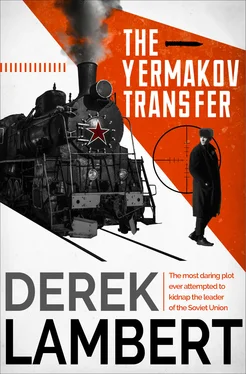Lev shrugged. “Maybe. But you’re a more convincing case. All your family records destroyed in Leningrad. Perhaps your mother was pure Russian.”
“She was a Jewess.”
“That’s not what your father told the authorities. And he’s registered as a Soviet citizen, too. So you see, your case is pretty clear-cut.”
Viktor twisted round angrily, making the car lurch. “What are you getting at?”
“Simply this.” Instinctively Lev looked around for eavesdroppers; but there were only the birds. “You can be far more useful to the movement than anyone with Jew stamped on his passport.” He gripped Viktor’s arm. “There is a movement within the movement. That’s where you belong.”
* * *
One month later Lev Soliman was expelled from the University. His one-room apartment was searched under Article 64 – “betrayal of the Motherland”. He was taken to the Big House and interrogated. A fortnight later he was transferred to a mental institution. Viktor saw him once more two years later; by that time he was insane.
* * *
Lev Soliman left Viktor Pavlov with the embryo of an underground movement that had its origins in April, 1942, when the Jewish Anti-Fascist Committee of the Soviet Union (JAC) was founded. In those days the Russians needed the Jews to help fight the Nazis and to spread propaganda to the four corners of the world to which the Diaspora had taken them.
For the first time since the Jewish sections of the Communist Party, the Yevsektsia , were disbanded in 1930, Soviet Jewry had in JAC an officially-sanctioned organisation. Its journal was called Unity and Lev Soliman’s parents were among its contributors.
JAC was, of course, another shooting star spluttering in the darkness of prejudice. The Jews thought that, by co-operating with the Soviets in defeating Hitler, they were also constructing a peaceful future in Russia. In 1943, when JAC emissaries Mikhoels and Feffer went on a tour of Jewish communities in the U.S.A., Britain, Canada and Mexico, Joseph Stalin personally wished them well.
Such was the hope of a new understanding between Russians and Jews that Zionist leaders even suggested a meeting between Chaim Weizmann and Stalin. Churchill was asked to get them together at Yalta in 1945; but Churchill turned down the idea: Churchill knew better.
All this time the Solimans worked joyously for the cause and the future of their son, Lev.
The Allies finally beat the Nazis and the Soviet attitude towards JAC began to cool: the Black Years of Stalin’s Jewish purges were beginning. On January 13, 1948, Solomon Mikhoels, director of the Moscow Yiddish State Theatre and one of the two emissaries who had spread the word to the world in 1943, was murdered in Minsk. He was a personality and he was emerging as the leader of Russian Jewry.
The murder was followed by the liquidation of the Committee. Lev Soliman’s parents were charged under Articles 58/10, part 2, to ten years in strict regime camps on charges of “belonging to a Jewish nationalist organisation and spreading nationalist propaganda”. Lev was looked after by the state.
When Kruschev came to power the Solimans were pardoned and the family was reunited in Moscow. Lev continued his education, winning a place at Moscow University.
But JAC had left its scars on him. He despised naïveté, he trusted no one. Organised protest served a function, but to Lev, it had a whine about it, a recognition of Soviet supremacy. Caution, caution. Lev Soliman spat on caution.
He gathered around him half a dozen young fanatics who believed that violence was the only honourable solution. Like other extremists throughout the world they didn’t necessarily represent the beliefs of those they fought for. But this didn’t bother them; they regarded the patient resolve of Soviet Zionists as weakness and they operated clandestinely treating both orthodox Zionists and Russians as the enemy.
This was the nucleus of subversion to which Lev Soliman introduced Viktor Pavlov. The nucleus of which Pavlov was soon to become leader.
* * *
In the autumn of 1962 Pavlov began to construct his cover. He already possessed Soviet nationality but he had to establish impeccable references. The secret police knew about his father; therefore they knew there was at least a strain of Jewish blood in him. So, with the approval of the K.G.B., he worked with the Jewish underground movement publishing samizdat newspapers, smuggling subversive literature out of the country – and informing on his colleagues.
Within a year he was an established agent provocateur in the student movement. He won a brilliant degree in mathematics and went to Leningrad to study computers to make himself invaluable to a country backward in such refinements.
There he met a girl who, at the age of eighteen, had been made a Heroine of the Soviet Union. Viktor Pavlov welcomed her as the means to make his cover unassailable.
Anna Petrovna was the spirit of Russia, the rose of Siberia. Her bravery was the inspiration for a legion of Komsomols to head east, to built cities in the frost, to tap the hostile territories of their wealth.
As a student geologist, Anna Petrovna had flown to Arctic Siberia in an eight-seater AN-2 with two young men. To her, the snow-covered taiga of the north, inhabited by reindeer and primitive tribesmen was a storehouse of precious stones – emeralds, amethysts, topaz, jasper, sapphires, garnets. But it was diamonds that fascinated her.
With a magnifying glass in one hand, she crawled beside a frozen river for two months, averaging a mile a day, searching for kimberlite, the blue-grey earth that advertises the presence of diamonds.
After the first month she couldn’t stand up straight. Towards the end of the second, when the wilderness was briefly thawing and she was paddling on raw knees in slush, she was on the point of giving up. One day she reached a spine of hills and gazed down on a plain patched with snow beneath a mauve haze. Idly, she stooped and picked up a handful of mud, straightening up painfully. The mud was blue-grey.
For a week she and the two young men dug. One bright morning they gazed down the shaft and saw a shiny blue light at the bottom. It was the first diamond chimney in the area and they called it “Blue Flash”.
Anna Petrovna and Viktor Pavlov met one evening at the White Nights club in Leningrad and fell in love; she unreservedly, he deeply and passionately but with a sliver of calculation in his soul, the chip of ice that never melted.
The marriage was popular. Such a fusion of talent; such a union of Russian beauty – he with his strong brown face and cap of glossy black hair, she the Siberian with her cool, glittering good looks – the sort of face that beckons from Aeroflot brochures. The wedding was honoured with a photograph in Komsomolskaya Pravda and a story that speculated on the handsome geniuses the couple would produce.
* * *
They spent their honeymoon in Siberia beside Lake Baikal – the Holy Sea, the Northern Sea, the Rich Sea. So right for their union with all its bizarre superlatives. Here Genghis Khan once camped in the heart of the territory of Marco Polo, Strogonoff, Yermak, Godunov, Kuchum. The deepest lake in the world, 400 miles long and 50 miles wide in places, filled by 336 rivers and emptied by only one, the Angara. Populated by fresh-water seals, omul and bright green sponges with which peasants clean their pots. Covered in winter by nine-foot deep ice which splits with a crack like thunder, tormented by storms and earthquakes which once, long ago, broke up the Gypsy Steppe on the eastern shore killing 1,300 people in the fissures, geysers and flood waters.
But today the waters were becalmed with floating islands of blossom like reflections of clouds and the only awesome sight was a ruff of white mountains in the distance.
Читать дальше












